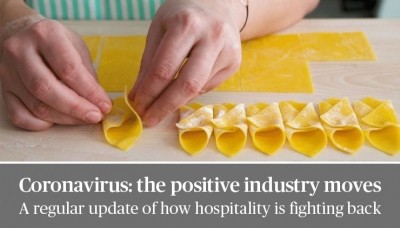United we stand
Live advice bureau - experts answer your hospitality questions

- Got a question? Email it to stefan.chomka@wrbm.com
A restaurateur asks: We’re a small restaurant in southeast London and our chef has been ill in isolation, so has been off work since 18 March. He’s supposed to be paid on 25 March. Do I pay statutory sick pay for these eight days or is it included in mandatory sick days?
Catherine Gannon, founder of Gannons Solicitors, says:
In terms of sick pay, the position is that you will be required to pay what they are entitled to under statute or the employment contract. If you have a company sick pay policy that the chef is entitled to then she/he would be entitled to that for any sick leave, similarly if there is no company sick pay she/he is entitled to statutory sick pay, that’s what should be paid.
The government are discussing measures to refund up to 2 weeks of SSP where employees have been off work due to COVID-19. To be eligible the business must have less than 250 employees. However, this has not been set up as yet and all we know at the moment is the information set out on the government’s website here
- Got a question? Email it to stefan.chomka@wrbm.com
Ian Mitty asks: I’m thinking of operating a takeaway service at my pub for four nights a week which I hope will give at least some staff some work However if I do this it will imperil their right to 80% pay announced last week will it not? Don’t want to do the right thing the wrong way!
Catherine Gannon, founder of Gannons Solicitors, says:
The general premise from an employment law perspective is that if staff are working they should be paid in accordance with their employment contracts.
The government are discussing measures to reimburse up to 80% of “furloughed” workers wage costs up to a total cap of £2,500 per month. We do know that HMRC intend to set up a portal for information regarding furloughed workers. Unfortunately, we don’t at the moment have a clear view on what ‘furloughed’ employees will mean. The non-legal definition of furlough is a leave of absence, but we do not have the definition under these circumstances e.g. will staff be able to work when able to or from home, will it include pensions etc. We are continuing to review the position daily and once we have some guidance from HMRC on the parameters of what it means to be furloughed we will produce a note, in the meantime the government’s guidance is set out on their website here
- Got a question? Email it to stefan.chomka@wrbm.com
Ruth asks: I understand we can offer takeaways from our pub but we are in a tiny village with a very limited number of customers so our numbers would not be able to cover the wages and costs of production. If we don’t offer this service, our chef is able to be paid at the 80% of his current salary – so it’s a conundrum? Can this be clarified?
Barry Turner, senior lecturer in Company Law & Corporate Governance at the University of Lincoln says:
When it comes to the situation regarding hospitality and leisure workers continuing to work producing takeaway food, they will not be designated as furloughed and will, therefore, not be eligible to be paid the job retention scheme payment of 80% of normal salary.
I am unsure how keeping a takeaway-only service operational would be tenable for most businesses but it is dependent on how much of a pub’s income is generated by this as opposed to its on-sales.
- Got a question? Email it to stefan.chomka@wrbm.com
Mark Higgs asks: Has anyone heard if there will be any grants for pubs over the £51,000 rateable value?
Robert Hayton of real estate adviser Altus Group says:
Guidance on the grant funding scheme was issued yesterday (Tuesday 24 March) by the Department for Business, Energy & Industrial Strategy for England while the Welsh government’s finance minister confirmed its devolved arrangements.
In England, £25,000 will be available for those retail, leisure and hospitality properties with a rateable value within the £15,001 to £51,000 banding, while in Wales, it is within the £12,001 to £51,000 banding, ie, those outside the scope of small business rates relief (SBRR). For those within the scope of SBRR, the grants will be £10,000. The grants are available upon a per-property-basis rather than per business.
The Government has termed the scheme as being for “small business” but, in reality, given the qualifying threshold is for all retail, leisure and hospitality premises with a rateable value of less than £51,000, it is simply aimed at small properties only.This scheme is far from perfect. For example, businesses with a large property estate can claim the grant for each and every property below the qualifying threshold up to a maximum of €800,000 (£728,000) given the temporary framework for EU state aid because the UK is still in transition.
That said, medium-sized properties, just above the rateable value threshold, run by independents for example, as things stand, will receive nothing. The grants are not, therefore, targeted nor based upon need.
In England and Wales, there are 16,036 pubs that fall within SBRR and are now entitled to grants of £10,000 while there are 15,891 pubs eligible for grants of £25,000 subject to EU state aid limits. Sadly, 9,136 pubs above the qualifying threshold of £51,000 in rateable value won’t receive any grant funding as things currently stand.
















